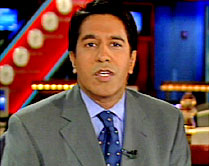ZAHN: For a point
of reference, I'd like for you to analyze pictures of Osama bin
Laden that apparently were taken prior to September 11. Describe to
us the color and the tone of his skin, and then I want you to
contrast that with pictures we know to have been taken much later.
GUPTA: You can look [at pictures from a December 2001 video]
and notice that he has what some doctors refer to as sort of a
frosting over of his features -- his sort of grayness of beard, his
paleness of skin, very gaunt sort of features. A lot of times people
associate this with chronic illness. Doctors can certainly look at
that and determine some clinical features.
But even more than that, it's sometimes possible to differentiate
the specific type of disease or illness that he may be suffering
from. The sort of frosting of the appearance is something that
people a lot of times associate with chronic kidney failure, renal
failure, certainly someone who is requiring dialysis would have
that.
He's also not moving his arms. I looked at this tape all the way
through its entire length. He never moved his left arm at all. The
reason that might be important is because people who have had a
stroke -- and certainly people are at increased risk of stroke if
they also have kidney failure -- he may have had a stroke and
therefore is not moving his left side. And in the rest of the
videotape, he does move his right side a little bit more than he
does his left. So those are some of the things that are sort of "of
note" here in this more recent videotape.
ZAHN: I think we need to remind the viewers once again that
the president of Pakistan talked about [bin Laden] importing two
dialysis machines into Afghanistan. Of course, no one other than the
president of Pakistan right now is confirming that [bin Laden] in
fact needed dialysis.
GUPTA: That's right. And again, renal dialysis -- talking
about hemodialysis -- is something that really is reserved for
patients in end-stage renal failure. That means their kidneys have
just completely shut down.
The most common cause of something like that would be something like
diabetes and hypertension. Once that's happened, if you're separated
from your dialysis machine -- and incidentally, dialysis machines
require electricity, they're going to require clean water, they're
going to require a sterile setting -- infection is a huge risk with
that. If you don't have all those things and a functioning dialysis
machine, it's unlikely that you'd survive beyond several days or a
week at the most.
ZAHN: If he had all these things you're talking about to keep
the dialysis machine running, how much help does he need around him
to administer the treatment?
GUPTA: You certainly need someone who really knows how to run
that dialysis machine. You have to have someone who's actually
assessing his blood, Osama bin Laden's blood, to see what particular
dialysate he would need, and to be able to change his dialysate as
needed. So you'd need a kidney specialist, a technician -- quite a
few people around him.
 recently
released videotapes and the possibility that the accused terrorist
leader was undergoing kidney treatment.
recently
released videotapes and the possibility that the accused terrorist
leader was undergoing kidney treatment.